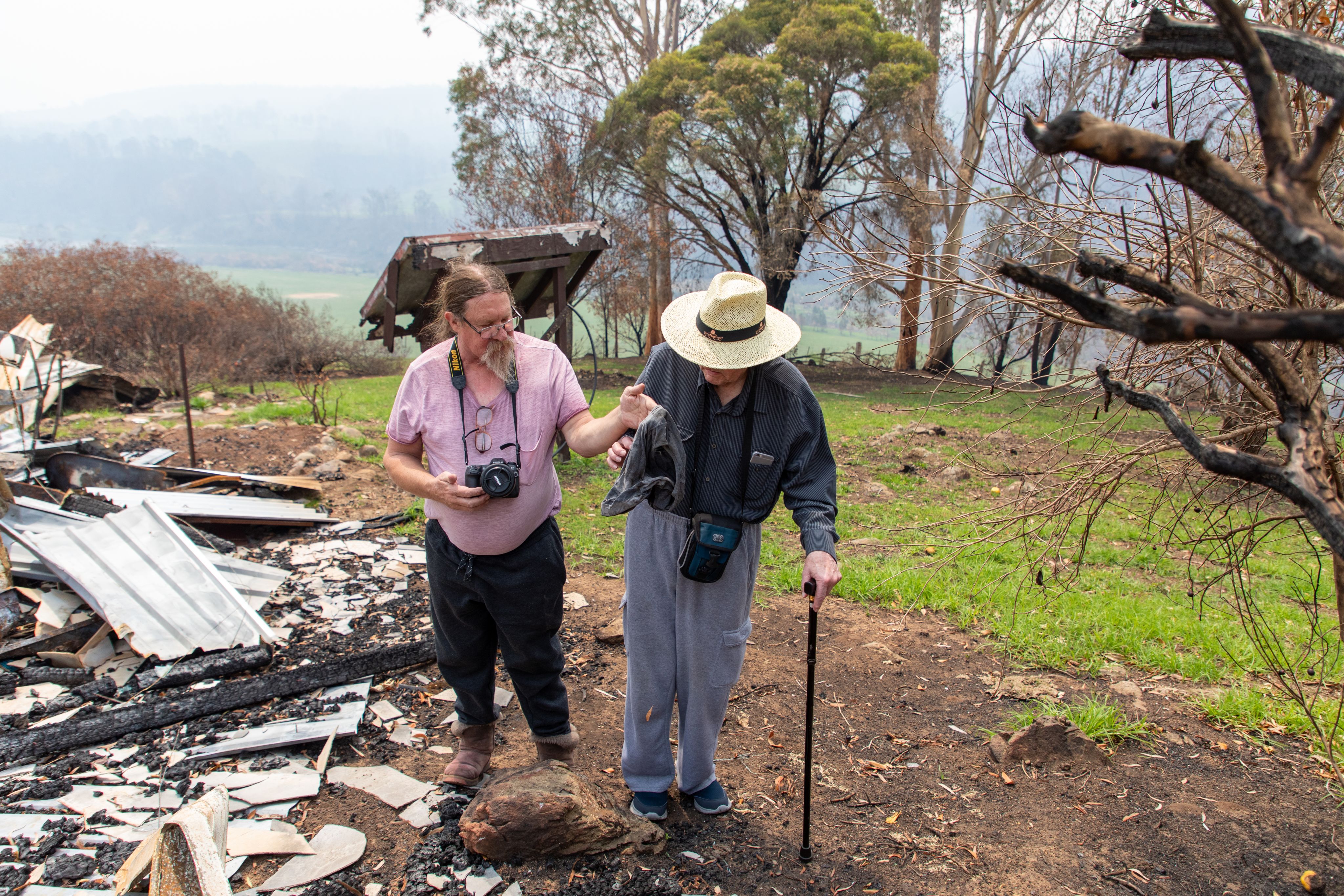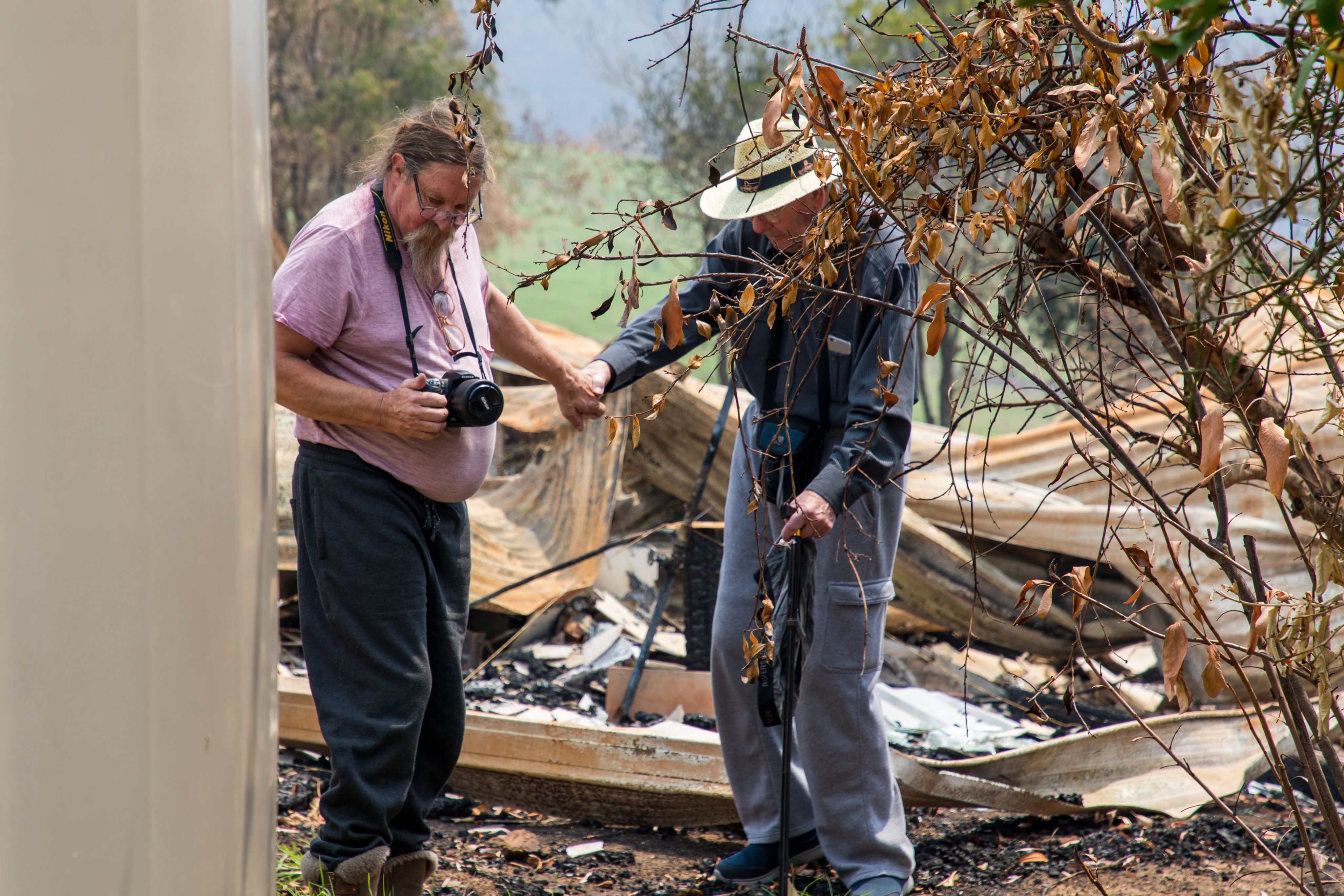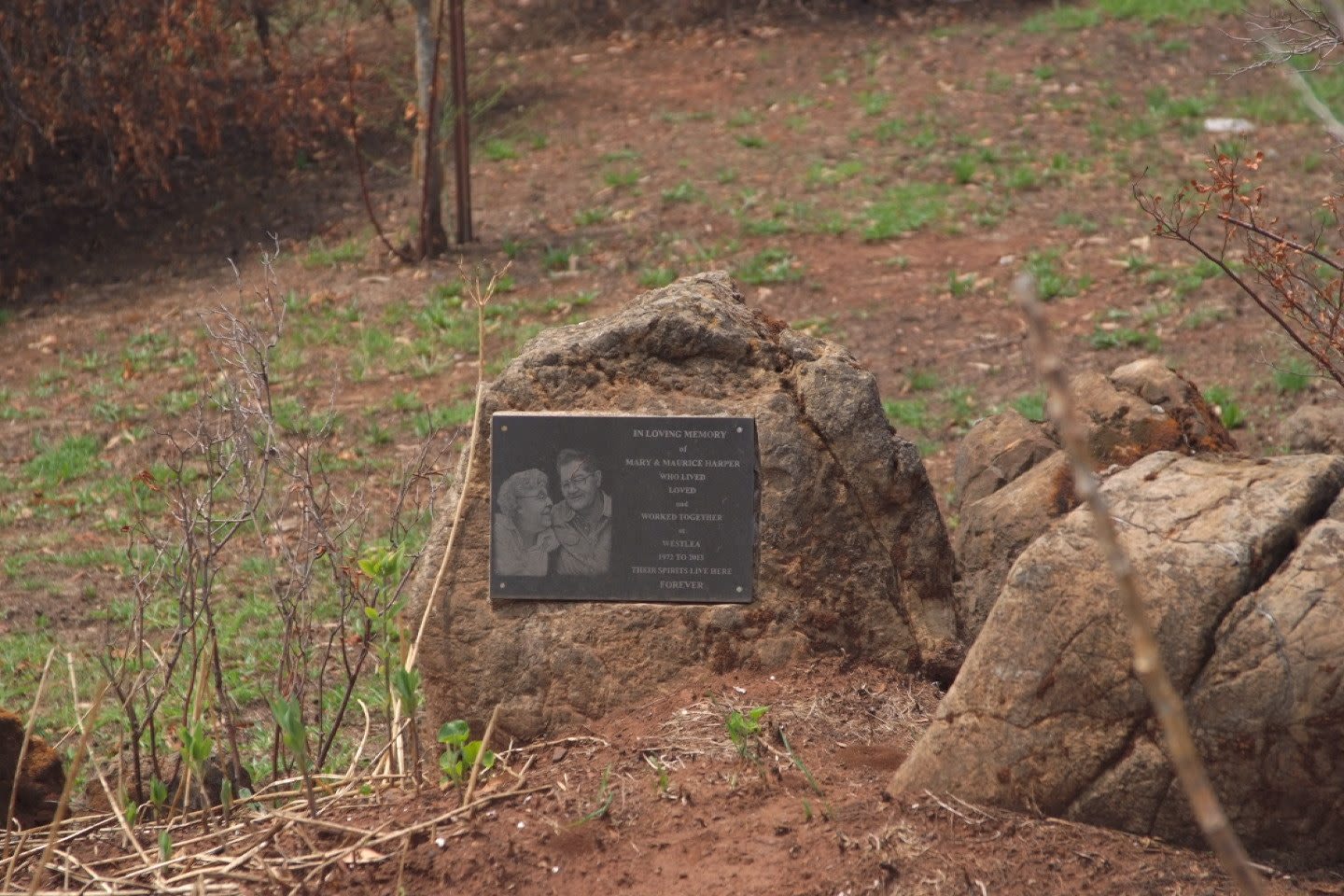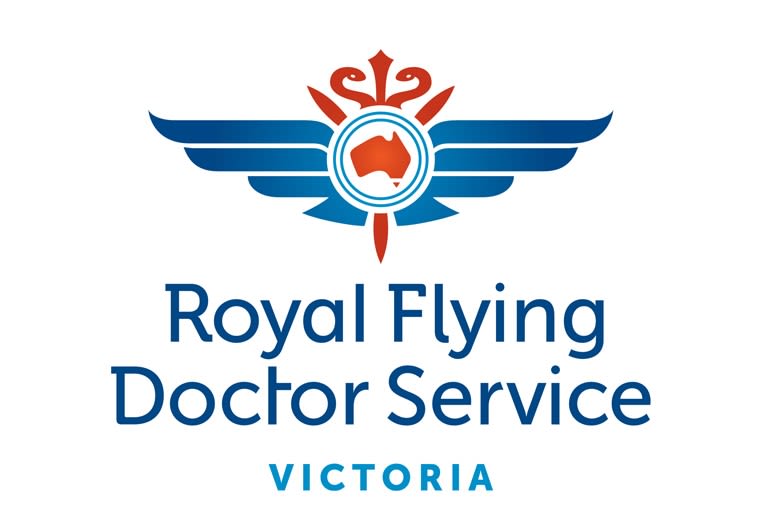The Long Road to Recovery

Mick Harper can clearly remember the day he first visited the property his parents were thinking of buying in Buchan. He was 13 years old, and his parents had tired of city life and wanted a tree change.
“When I saw the place, I said, ‘Look, if you don't buy this, you’re mad’,” Mick says with a laugh. “It had a frontage to the Snowy River and was absolutely gorgeous. I thought it was perfect.”
Over the years that followed, Mick moved around a bit for school and work, but the only place that ever felt like home was Buchan. Then, after his mother passed away, he finally returned to this picturesque riverside farm in order to care for his father.
Tragically though, it was from this beloved family property that Mick watched the Black Summer bushfires burn across the Buchan Valley in late December of 2019.
“I said to Dad, ‘Look, let’s just pack the cars as if we are going to evacuate and just be ready’,” Mick recalls. “The Sunday before the New Year, the fire was really bad, and it was obviously going to come down and we knew we would have to evacuate. At seven o’clock on the Monday morning, Dad and I left and went into town. And towards the end of that day, it all turned pear shaped everywhere as the fire hit Buchan.”
What followed was an excruciating wait, to find out what, if anything, would be left of their home. The answer didn’t come until days later.
“My parents' house, my house, the farm shed and all the farm machinery were burned,” says Mick. “The whole property was burned. At that time, we didn't know what had happened to the cows, of which we had about 30 head; we just couldn't find them. Eventually, my eldest brother managed to get out there to have a look and found the cows. They were pretty much unscathed, which was a miracle.”
Other than his cows, the only thing to survive the blaze was an old caravan stored on the property.
“The one thing that the fire didn't get was the caravan that my grandmother used to live in. It was just incredible. It was as if Nan was hovering over it, going, ‘You're not having this!’.”
More somberly, Mick adds, “I'd never seen a fire so intense. I had two cars parked near the house, and both of their motors had melted and were dribbling out the front of the cars.”

With the devastating damage now assessed, Mick started down the long and brutal road to recovery – a process complicated further still by his ailing health.
“A few years beforehand, I’d had major heart surgery and a valve replacement, and I hadn’t been overly well ever since,” says Mick. “Then about five years prior to the fires, I'd been diagnosed with two aneurysms. And so by the time the fire came through, I was feeling a bit like a walking time bomb.”
But the roadblocks didn’t end there. Not only was Mick was struggling to get his 92-year-old father into care in Bairnsdale, but he was running into endless issues with the rebuild of his house. And then, of course, there was the COVID-19 pandemic to contend with. Even the process of trying to replace his mobile phone, which had been lost to the fire, cost him “a week I’ll never get back.”
“All of those things were really catching up with me, and I was just trying to deal with everything,” says Mick.

Mick and his dad visiting what remained of their beloved home.
Mick and his dad visiting what remained of their beloved home.
However, one morning not long after the fires, when Mick was having a coffee at the roadhouse in Buchan, a man he had never met before wandered over to say hello.
“He [Campbell] just sat down and we started chatting, and then he asked me the question: Did you go through the fires? And I said, ‘Yeah, we lost basically everything’. It was then that he told me about the mental health service the Royal Flying Doctor Service was offering in town.”
Campbell Sinclair is a mental health clinician with the Flying Doctor Wellbeing program, which is a free service offering confidential face-to-face and telehealth consultations to rural Victorian communities. Following the Black Summer bushfires, the Royal Flying Doctor Service (RFDS) Victoria launched its dedicated Bushfire Recovery Counselling and Support service to provide those people affected by the fires in East Gippsland with access to wellbeing support in their local community. The service is delivered in partnership with Relationships Australia Victoria (RAV) with funding from the Gippsland Primary Heath Network (PHN).
“There were a lot of things I needed to deal with, not least of all my health. All sorts of issues just kept coming and coming and getting thrown at me. And so when Campbell ambled across the road and introduced himself, it was like this huge relief.
“I remember I said to Campbell, ‘Look, I can see the end of my tether, and it's not that far away’. And he said, ‘Well, we’d better have a chat then’.”
After speaking with Campbell several times, Mick also spoke with Michelle Clay from the Flying Doctor’s Outreach CARE service, which provides non-clinical mental health support to bushfire-affected communities in East Gippsland. More recently, Mick has been speaking with Robyn Smith, a mental health clinician who has been with the Flying Doctor Bushfire Recovery Counselling and Support service since its very inception.
“They were all absolutely fabulous, and the fact that this service was available pretty quickly after the fires was just fantastic” says Mick. “I really could not have managed without the support those three people gave me, along with the support offered by Gippsland Lakes Community Health and the bushfire relief people.
“I actually ended up back in hospital last year for two months, as my artificial heart valve got infected. It was madness. It was too much all at once. Just one thing after another after another after another. But with Robyn’s support, at no time did I ever feel like jumping off a cliff. Even now, knowing that Robyn is still there if I need to talk is great.
“I'm out of the woods now, but I know it wouldn't take much to tip me over the edge again – not that I ever fell off the edge, but at least now I've got a few little tools that I can apply to things like panic attacks and when I'm really stressed out or concerned. So that's really important.”

An aerial view of the burnt land surrounding Mick's home.
An aerial view of the burnt land surrounding Mick's home.
Today, Mick is using these tools to focus on his future. His house is now rebuilt and furnished, and as soon as he finalises the plumbing and installs the solar power system, he’ll finally be able to move back home to that perfect spot on the banks of the Snowy River.
Mick is also finding the time and the energy to get back into his hobbies. A passionate musician and poet, Mick sadly lost all his musical equipment and a lifetime’s worth of poems to the fires that tore through his house. However, he now feels able to start creating again.
“My little stay in hospital was financially disastrous, as I invoked what you call retail therapy,” laughs Mick. “I spent all that time in the hospital bed just looking online at music stores. I really enjoy my music.
“I've now got two little keyboards, so I can at least start playing things. And I've been using my iPhone as a little recorder so I can actually record ideas.” Mick pauses, before adding with another laugh, “They’re pretty lousy, but that’s alright.”
Poetry has proven harder for Mick to get back into, but he’s not concerned. “It’ll come. There’s no urgency to it.”
When looking back over the past three years, Mick can see the impact the Flying Doctor’s free mental health service has had on the entire community of Buchan.
“I know a couple of people who have utilised the service, and all of us are just blown away by it,” says Mick. “As a community, I think it's really helped. The Flying Doctor has made a real difference.”
The only issue on the horizon is what will happen if the service doesn’t receive additional funding this year.
“With any natural disaster, everybody seems to put a timeframe of two years on the recovery,” says Mick, acknowledging that the Flying Doctor Bushfire Counselling and Support service was originally only funded for two years. “But the people who are most severely affected will need support for much longer than that. Funding should be for at least five years, as it’s so important for these services to have a presence in the places where people have been affected. It's so good to know that there's somebody to ring if you need a chat.”

The memorial for Mick's mum, Mary, which thankfully survived the fire.
The memorial for Mick's mum, Mary, which thankfully survived the fire.
The road from December 2019 has been a long one for Mick, and for people right across Far East Gippsland. Hurdles and setbacks have been found around almost every corner, and the rebuild will continue for years to come. However, one thing that was clear to Mick from the very beginning was that he, and everyone in his beloved community of Buchan, needed to make their mental health a priority.
“After the fires, I could have very easily sat in the corner rocking backwards and forwards sobbing. But I didn't. I just said to myself, ‘This is a new start’. That was the only way I could look at it,” says Mick. “There were silly things, like you'd look around and all the paddocks were black, and I'd think, ‘No, I can’t see burnt paddocks; I see paddocks full of potash and with the first rain, there’s going to be full on grass growing everywhere’.
“You’ve just got to look at the positives wherever you can.”
After speaking with Campbell several times, Mick also spoke with Michelle Clay from the Flying Doctor’s Outreach CARE service, which provides non-clinical mental health support to bushfire-affected communities in East Gippsland. More recently, Mick has been speaking with Robyn Smith, a mental health clinician who has been with the Flying Doctor Bushfire Recovery Counselling and Support service since its very inception.
“They were all absolutely fabulous, and the fact that this service was available pretty quickly after the fires was just fantastic” says Mick. “I really could not have managed without the support those three people gave me, along with the support offered by Gippsland Lakes Community Health and the bushfire relief people.
“I actually ended up back in hospital last year for two months, as my artificial heart valve got infected. It was madness. It was too much all at once. Just one thing after another after another after another. But with Robyn’s support, at no time did I ever feel like jumping off a cliff. Even now, knowing that Robyn is still there if I need to talk is great.
“I'm out of the woods now, but I know it wouldn't take much to tip me over the edge again – not that I ever fell off the edge, but at least now I've got a few little tools that I can apply to things like panic attacks and when I'm really stressed out or concerned. So that's really important.”

An aerial view of the burnt land surrounding Mick's home.
An aerial view of the burnt land surrounding Mick's home.
Today, Mick is using these tools to focus on his future. His house is now rebuilt and furnished, and as soon as he finalises the plumbing and installs the solar power system, he’ll finally be able to move back home to that perfect spot on the banks of the Snowy River.
Mick is also finding the time and the energy to get back into his hobbies. A passionate musician and poet, Mick sadly lost all his musical equipment and a lifetime’s worth of poems to the fires that tore through his house. However, he now feels able to start creating again.
“My little stay in hospital was financially disastrous, as I invoked what you call retail therapy,” laughs Mick. “I spent all that time in the hospital bed just looking online at music stores. I really enjoy my music.
“I've now got two little keyboards, so I can at least start playing things. And I've been using my iPhone as a little recorder so I can actually record ideas.” Mick pauses, before adding with another laugh, “They’re pretty lousy, but that’s alright.”
Poetry has proven harder for Mick to get back into, but he’s not concerned. “It’ll come. There’s no urgency to it.”

When looking back over the past three years, Mick can see the impact the Flying Doctor’s free mental health service has had on the entire community of Buchan.
“I know a couple of people who have utilised the service, and all of us are just blown away by it,” says Mick. “As a community, I think it's really helped. The Flying Doctor has made a real difference.”
The only issue on the horizon is what will happen if the service doesn’t receive additional funding this year.
“With any natural disaster, everybody seems to put a timeframe of two years on the recovery,” says Mick, acknowledging that the Flying Doctor Bushfire Counselling and Support service was originally only funded for two years. “But the people who are most severely affected will need support for much longer than that. Funding should be for at least five years, as it’s so important for these services to have a presence in the places where people have been affected. It's so good to know that there's somebody to ring if you need a chat.”

The memorial for Mick's mum, Mary, which thankfully survived the fire.
The memorial for Mick's mum, Mary, which thankfully survived the fire.
The road from December 2019 has been a long one for Mick, and for people right across Far East Gippsland. Hurdles and setbacks have been found around almost every corner, and the rebuild will continue for years to come. However, one thing that was clear to Mick from the very beginning was that he, and everyone in his beloved community of Buchan, needed to make their mental health a priority.
“After the fires, I could have very easily sat in the corner rocking backwards and forwards sobbing. But I didn't. I just said to myself, ‘This is a new start’. That was the only way I could look at it,” says Mick. “There were silly things, like you'd look around and all the paddocks were black, and I'd think, ‘No, I can’t see burnt paddocks; I see paddocks full of potash and with the first rain, there’s going to be full on grass growing everywhere’.
“You’ve just got to look at the positives wherever you can.”
To find out more about the Flying Doctor Bushfire Recovery Counselling and Support, visit our website.
